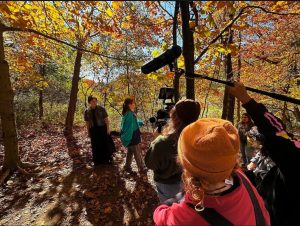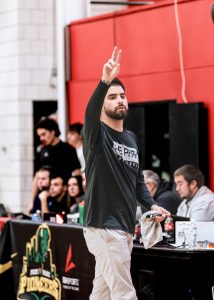Open forum held for Playhouse usage
November 13, 2019
Intense disagreements and confusion characterized a recent forum held by SAIL leaders Rachel Phillips and Brad Kovalcik, Dean of Student Life Michael Gieske, Director of Conference and Event Services Tina Morton and Drew Martorella, Assistant Vice President and Managing Director of the Pittsburgh Playhouse.
The Students Activities, Involvement and Leadership (SAIL) staff and the Pittsburgh Playhouse hosted a “Student Organization Playhouse Forum” on Nov. 11 in Thayer Hall’s JVH auditorium.
Only six students were in attendance, but administration officials consistently fielded questions for an hour, with the topic routinely returning to the costs for renting out spaces in the new Playhouse.
At the beginning of the forum, administrators were quick to assure that renting a space in the Playhouse was a simple process. Morton oversees requests from organizations to book venues on campus.
“…it’s the same process that every department on campus uses, every external request that I receive comes in,” Morton said. “I compile them all into a spreadsheet, and then we review all of them so nobody’s given preferential treatment. “
However, while all spaces on campus must be requested and approved, most venues do not require any kind of payment from students. The Playhouse is the notable exception.
USG President Jake Berlin, a senior mass communications major, particularly addressed monetary costs posed to students.
“…the understanding amongst students was that the Playhouse was treated just as any other space on campus, that this was just yet another building,” Berlin said. “It just doesn’t seem as equitable as the other options for students.”
“Well, it’s different,” Martorella told Berlin. “Every different space on campus has a different set of policies surrounding the use of it.”
Fees include the valuable equipment the Playhouse spaces provide as well as staffing for events.
After extensive talks about the stringent Playhouse requirement of staffing and security at events, Berlin questioned whether Martorella was “afraid” that “students won’t use the equipment correctly.”
“No it’s because it’s specialized equipment that we define who touches our equipment and who runs the equipment,” Martorella said. “I certainly know that theatrical spaces are inherently dangerous spaces. Like construction zones, they involve types of equipment and types of activity that are inherently contoured towards a tremendous amount of risk.”
Martorella proceeded to describe how a fly rail (a piece of theatrical equipment) falling could potentially kill someone or make them “lose fingers.”
Martorella and Morton also discussed the possibility of creating estimate packages for student organizations planning on renting out the spaces, with the advisory that there would be a number of variables that could affect the actual cost for organizations.
There is no structure in any university system yet for creating these estimates. They mentioned that requests even without these estimates take weeks to process. SAIL Director Brad Kovalcik brought up the issue of the estimates not being timely enough for student organizations to file for funding.
“I just know for USG funding process [clubs] are putting in requests twice a semester,” Kovalcik said. “So if you don’t know the numbers you need when that USG request is there and you’re still waiting for that estimate, there’s no way for them to fund that for you.”
A club that would seek USG funding for using a space at the Playhouse is Pinnacle Productions, a student-run production company. They use different venues across campus to host their shows, but they have not been able to use the Playhouse due to the fees involved. Although they use a ticketing system through Pointsync, the Playhouse insists that they use a physical ticketing system because of contract agreements.
Another price concern the organization had was due to the labor costs.
“The frustration that I have with [labor costs] is that the people who do the tech work for us on our shows are the same people who do tech work for the shows in the conservatory,” Pinnacle’s president Anthony Giancola said.
Giancola elaborated by saying he didn’t understand why organizations had to pay for labor costs when they bring their own equipment to the space.
Martorella initially said he didn’t know how to answer Giancola’s question and emphasized the importance of the Playhouse employees being involved in student organizations’ events. He expressed his frustration with the continual emphasis on pricing structures for using spaces at the Playhouse.
“What I’ve come to talk to this about is…what it would take to work in the spaces. Also, I’m aware too about the student activities fee. I think that student activities is a way of adding value to student life [and] to the institution,” Martorella said. “When we have a student activities group or club that wants to work with us to present events in the Playhouse that would be impactful to the entire student body and we have a 500 seat venue, that would be wonderful.”
“Truly it’s a new thing. They just started the year when the CMI first started doing the speaker series, that was the first non-Playhouse kind of event that were being [done] with the anticipation that we would build on that in the new Playhouse,” Gieske said. “…[it] was the first conscientious effort the university made to start a group of things other than theater productions and plays there.”


















